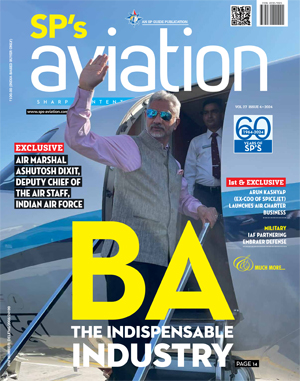INDIAN ARMED FORCES CHIEFS ON
OUR RELENTLESS AND FOCUSED PUBLISHING EFFORTS

SP Guide Publications puts forth a well compiled articulation of issues, pursuits and accomplishments of the Indian Army, over the years

I am confident that SP Guide Publications would continue to inform, inspire and influence.

My compliments to SP Guide Publications for informative and credible reportage on contemporary aerospace issues over the past six decades.
Revamp of IAF Helicopters for VVIP Travel

NEWS:
The Indian Air Force (IAF) is waiting for a nod from the government for converting some of its Mi-17V5 helicopters that are currently under acquisition, into VVIP class machines to fly the President and Prime Minister. After the acquisition of AgustaWestland’s AW-101 helicopters was blocked over allegations of corruption, the IAF was looking for options to equip the Air Headquarters Communication Squadron with helicopters suitable for VVIP travel. A call will have to be made soon as the ageing Mi-8s, which are being used in the elite communication squadron, are already on life extension. One of the options is to use some of the newly acquired Mi-17V5s, the most advanced military helicopters in service, for transportation of VVIPs.
VIEWS:
In March 2013, the IAF had apprised the Ministry of Defence (MoD) about the state of the fleet of helicopters available with the Palam-based Air Headquarters Communication Squadron that is responsible for providing air transportation for the President and Prime Minister of India as also others that fall in the category of VVIPs. At that time, the IAF had informed the MoD that after February 2014, there would not be a single helicopter in its elite squadron which would be fit to carry VVIPs. The currently available fleet of Russian-made MI-8 helicopters would be completing even their extended life by February 2014 and would not have any replacement, as the investigation into the VVIP helicopter scam had cast a shadow over acquisition of the AgustaWestland AW-101 helicopters.
Today, the fleet of the Mi-8 helicopters that were inducted in 1970s are obsolescent. These no longer provide the level of safety that the IAF is expected to ensure for VVIP travel. These helicopters were diverted from the operational fleet of the IAF for VVIP travel which is essentially a non-military and non-operational role. In 1999, the IAF had in fact initiated a case in accordance with the Defence Procurement Procedure (DPP) for the acquisition of modern platforms developed for VVIP travel to replace the Mi-8 fleet. It took over a decade of intense effort to identify a suitable platform and negotiate the highly complex and elaborate procedure culminating in the finalisation in March 2010 of the Rs. 3,600-crore contract for 12 three-engine AW-101 helicopters from AgustaWestland, an Anglo-Italian firm under the Italian aerospace major Finmeccanica. The IAF preferred the AW-101 for induction over the only other competitor in the race, the American Sikorsky S-92. However, reports of financial impropriety in the processing of the tender surfaced in 2012 as the Italian Government initiated investigations into the reports of payment of kickbacks to Indian entities. Under pressure, the Indian Government suspended the contract in February 2013 by which time three helicopters had already been delivered to the IAF. A fourth AW-101 was ready for delivery and the rest were in advanced stages of construction. Also, 30 per cent of the contract value had already been paid in advance. Unfortunately, the contract was cancelled on January 1, 2014, frustrating the efforts over decade-and-a-half by the IAF and the MoD.
The IAF now has a crisis on its hands, one that is clearly not of its own making. The IAF does not have a helicopter fleet for VVIP travel. The three AW-101 helicopters delivered against the aborted contract cannot be used for this purpose on account of lack of product support from the original equipment manufacturer that has been discredited. Experience in the recent past not only with the AW-101 fiasco but with other ongoing tenders under the DPP indicates that initiation of a fresh tender at this stage for a helicopter fleet suitable for VVIP travel is not a practical possibility. The IAF therefore has opted for the easiest way out of the predicament and that is to modify to VVIP standards the required number of newly acquired Mi-17V5 helicopters, the latest in the series in its operational fleet. The implication of this decision is that the IAF in effect will degrade its own operational capability in the rotary-wing regime by diverting operational platforms for VVIP travel. Fundamentally, it was to obviate precisely this situation that the IAF had initiated a case for helicopters designed and built for VVIP travel. Unfortunately, the IAF is back to square one and is left with no option but to once again divert helicopters from the operational fleet for VVIP use.
In retrospect, it appears that despite the allegations of wrongdoing by individuals, cancellation of the contract for AW-101 helicopters by the MoD was not the best course of action. It has not only been financially disastrous for both AgustaWestland and the MoD, the IAF is left without the wherewithal to discharge its responsibility in respect of VVIP travel. While the cancellation of the AW-101 contract will not impact the operational capability of the IAF, cancellation of defence procurement contracts in this manner could have a deleterious effect on the operational capability of the armed forces.
While financial impropriety in the procurement of military hardware must never be ignored, cancellation of a contract on account of such aberration is not the best solution as it ultimately impacts national security. In case of allegations of wrongdoing in defence procurement, what needs to be done is to separate crime from the contract and deal with the offenders without killing the contract.





